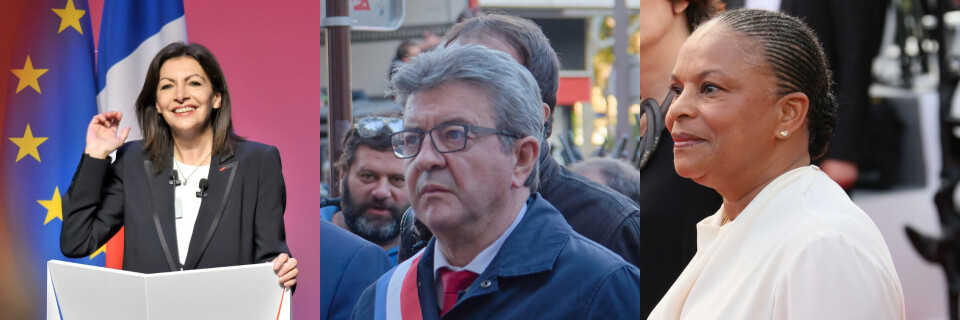-
Trump calls for Marine Le Pen to be freed (but she is not in prison)
US president said her embezzlement court case was a ‘witch hunt’
-
France’s €3 book delivery fee challenged in EU court by Amazon
Online retailer said measure is protectionist and ‘in breach of EU laws’
-
Allergies: How to know pollen levels in your commune of France
Interactive online maps can track and predict how pollen is changing in the air
French political parties: What killed off the Left and can it recover?
We ask three French experts why France’s Left has all but disappeared - with one saying it was failing to support the new drivers of society, such as ecology

The French Left, and in particular the Parti Socialiste (PS), had a disastrous showing in the 2017 presidential elections, with PS candidate Benoît Hamon gaining just 6% of votes – and it is still struggling five years on.
This is a heavy blow for a party that ran the country with François Mitterrand between 1981 and 1995 and François Hollande from 2012 to 2017.
Current PS candidate Anne Hidalgo, mayor of Paris, had called for unity and a single candidate for the Left (there are currently nine, including two Greens), saying it would give a more realistic chance of a left-wing president.
However, the idea flopped after several leading left-wingers, such as Jean-Luc Mélenchon (far left) and Yannick Jadot (Green) ruled it out.
‘The PS is no longer capable of winning a presidential election’
The discord highlighted the ongoing downfall of the PS, with media experts increasingly asking: “Is the Socialist Party dead?” Mid-January polls do not offer much hope, with Hidalgo polling around 2%, and other left-wing candidates polling from 1.5% (Arnaud Montebourg, who has since withdrawn from the race) to Christiane Taubira at 4.5%.
A final attempt to find a candidate to unite the Left was to be put to the vote at the end of January with La Primaire populaire, an unofficial citizen’s initiative supported by 400,000 people. It will ask supporters to choose, by majority vote, one of seven candidates.
However it is widely criticised as pointless and just liable to spread confusion before the election, especially as it includes Ms Hidalgo, Mr Mélenchon and Mr Jadot even though they have not agreed to respect it. Ms Taubira is the best-known figure supporting it.
We ask three experts if there is any hope for the Socialist Party? “The PS is no longer capable of winning a presidential election,” says Christophe Sente of Brussels University, author of La gauche entre la vie et la mort (The Left between life and death).
He dates its decline from as long ago as Lionel Jospin’s defeat against the far right Jean-Marie Le Pen in the first round of the 2002 presidential election.
Its decline is further illustrated by the decision to sell its headquarters in rue de Solférino in 2017, a cosy building in the heart of Paris where its officials had worked for 37 years, and relocate to Ivry-sur-Seine in the Val-de-Marne.
‘A party completely disconnected from the national story’
The PS has also been unable to stop the steady loss of members.
Former presidential candidate Benoît Hamon left politics in 2018 and 30% of those working for it as party officials or as politicians have followed a similar path in a five-year span, wrote Le Monde in 2020. Voters have deserted as well.
Rémi Lefebvre is one of them. A political science teacher at the Université de Lille, he wrote an op-ed in socialist newspaper Libération in 2018 to announce he was leaving the party after being a member since 1995.
“The party exploded during François Hollande’s term,” he said, arguing his tenure fractured the party.
Then-prime minister Manuel Valls admitted as much in the run-up to the 2017 elections, saying the party was caught between “irreconcilable” factions, a term widely picked up by detractors and the opposition.
Mr Lefebvre lists ecological ideals, a social democracy movement and radicals as key opposing forces that have torn the party apart.
While the second were captured by Emmanuel Macron, the latter leaned toward Jean-Luc Mélenchon, leader of the far-left party La France Insoumise.
Other politicians and experts have put the problems down to egocentric behaviour, the absence of a clear European project, losing touch with the working class, or identity politics.
“It has become a headless fighting machine run by apparatchiks,” sociologist Jean Viard told The Connexion, adding that the party is “completely disconnected from the national story”.
Dr Viard said the party embodies the state’s bureaucracy and has too many members who have not worked in the private sector.
He added that the PS historically espoused progressive ideals which have now been accomplished, such as universal healthcare and social benefits.
However, it had failed to support feminism and ecology, two of the main engines of modern society, he claimed.
However grim the outlook might be, the PS still retains some strong local public figures and a reservoir of voters.
Well-known figures such as Anne Hidalgo and Martine Aubry run the cities of Paris and Lille, and other Socialist-led cities include Brest, Nantes, Bordeaux, Rouen, Rennes and Montpellier.
In total, the PS runs 42 towns with more than 30,000 residents. “The PS is a party of ups and downs which can be extremely efficient when associated with an efficient intellectual movement,” said Mr Viard, who thinks it could have a fresh start if it positions itself more clearly on ecological issues.
However, Mr Lefebvre is not optimistic for its chances. It could suffer a terrible blow in April if none of its candidates passes the 5% threshold necessary to obtain reimbursement of some of a candidate’s campaign costs. “It has been going nowhere and it will go nowhere,” he said.
Related articles
French presidential election: Key candidates and their main policies
When will we know candidates for 2022 French presidential election?
Tinder-style app matches user with ideal French presidential candidate
























